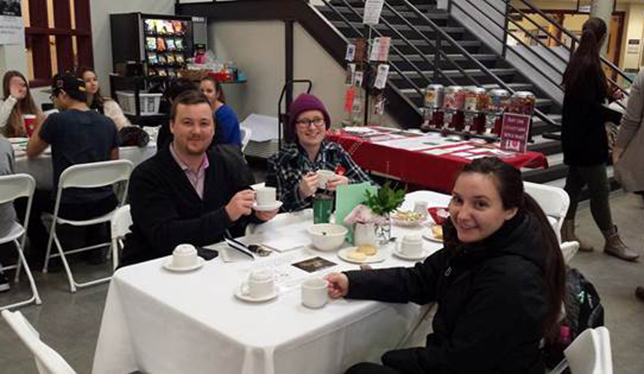The Wellness Centre at Thompson Rivers University is hosting a tea party, but don’t expect your grandmother’s scone-and-clotted-cream affair. For starters, the party games all revolve around sex.
Wellness coordinator Chelsea Corsi found her inspiration for a tea-time talk on sexual consent thanks to a viral video. Tea and Consent, a three-minute animated video, aims to clarify the issue of sexual consent by comparing it to having a cup of tea: “If you say, ‘Hey, would you like a cup of tea,’ and they say, ‘Uh, you know, I’m not really sure,’ then you can make them a cup of tea – or not – but be aware they might not drink it. And if they don’t drink it then – and this is the important part – don’t make them drink it.”

The video stars a couple of stick figures and lines like, “If they’re unconscious, don’t make them tea. Unconscious people don’t want tea.” It started making the social media rounds in 2015. (The video was recently translated into French by Hugo Cyr, dean of the faculty of political science and law at Université du Québec à Montréal, with a voiceover by Bernard Derome, president of the Montreal Institute of International Studies at UQAM.)
“I try to use pop culture in what I do. The research shows that it helps, especially with young adults, to catch their attention,” Ms. Corsi says. To that end, she blended the video’s premise with a Downton Abbey theme to create Consent Tea, a tea service complete with fancy dress, china tea cups, table linens, finger foods and true or false quizzes about consensual sex.
“I wanted to get people talking about consent because sometimes they don’t know what to say, they don’t know how to ask, ‘What is consent.’ I wanted people to have an experiential learning piece, I wanted to have them actually doing something,” Ms. Corsi says.
Last year, about 90 people sat down for a cuppa and a chat at TRU’s Student Street, a busy thoroughfare on campus. (About 30 more people took their tea and talk to go, Ms. Corsi notes.)
“It was amazing to see all these different types of students and staff from different backgrounds, of different genders, talking about consent,” Ms. Corsi says. “It’s a ripple effect when you get people talking about something then they talk about it with their friends and their friends talk about it with their friends. That’s how change happens. That’s how people start to think about things in a different way.”
This year’s Consent Tea has been scheduled for November 15 to coincide with TRU’s annual Sexual Health Week.